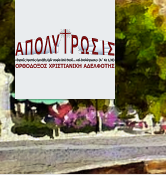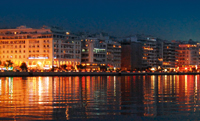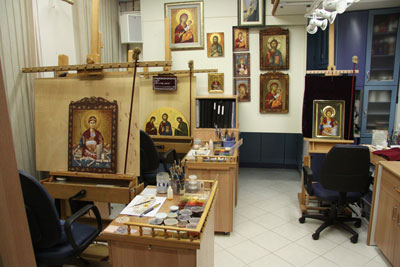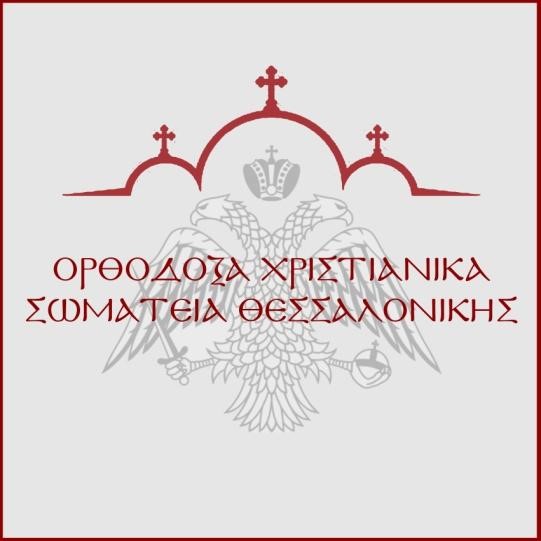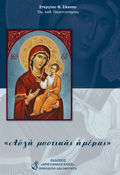 ΑΠΟΛΥΤΡΩΣΙΣ
ΧΡΙΣΤΙΑΝΙΚΗ ΟΡΘΟΔΟΞΗ ΑΔΕΛΦΟΤΗΣ
ΑΠΟΛΥΤΡΩΣΙΣ
ΧΡΙΣΤΙΑΝΙΚΗ ΟΡΘΟΔΟΞΗ ΑΔΕΛΦΟΤΗΣ
Super User
THE “LITURGY OF THE FAITHFUL” (B)
1. THE PRAYERS OF THE FAITHFUL
1a. Faithful/Good people
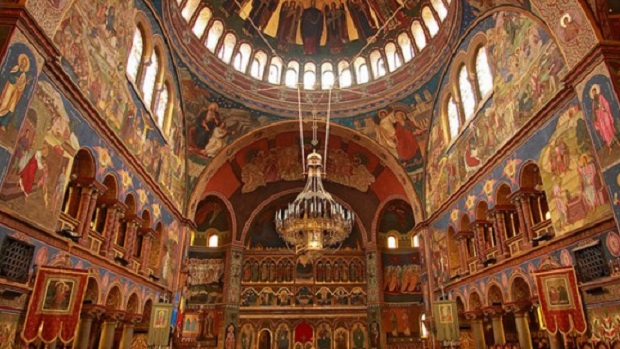 If order must prevail during the first part, the Liturgy of the Catechumens (those not yet baptized), so that everyone can hear the petitions, the prayers, readings and sermon, order must prevail much more in the second part. Now the Lord, no longer as Teacher but as Archpriest, prepares to celebrate the Sacrament of the Divine Eucharist, to offer His body and blood to the faithful. Those who really confess the “Symbol of the Faith” are the faithful. Only these can participate in this mystery of the Holy Eucharist.
If order must prevail during the first part, the Liturgy of the Catechumens (those not yet baptized), so that everyone can hear the petitions, the prayers, readings and sermon, order must prevail much more in the second part. Now the Lord, no longer as Teacher but as Archpriest, prepares to celebrate the Sacrament of the Divine Eucharist, to offer His body and blood to the faithful. Those who really confess the “Symbol of the Faith” are the faithful. Only these can participate in this mystery of the Holy Eucharist.
Are faithful the “christians” who come to church only on Christmas and Easter? If one were to ask these people: “Why don’t you come to church regularly?” The answer would be: “We don’t go to church, but we are good people.” Those who sign their own certificates of merit, are sadly mistaken.
First, they don’t know themselves. If they were to examine their own lives from childhood to this day, they would find that they have often violated God’s will as expressed in Scripture. No matter how good they may appear to be, they may be corrupt at heart. If they don’t do evil acts, this might be for fear of becoming caught in the nets of human justice.
Secondly, those who claim to be good don’t know the Bible. Because in the Gospels we read that in order to be saved, good deeds are not enough, no matter how many or how great they might be. A thousand acts of charity can’t save the unbeliever. If good acts could save a man, then it was not necessary for the Son of God to come into the world and be crucified. His sacrifice would have been in vain.
So, we are saved through faith. “Whoever believes and is baptized will be saved; whoever does not believe will be condemned” (Mk 16,16). Faith is indispensible for salvation. The same faith is indispensible for participation in the mystery of the Holy Eucharist. We gain nothing if we go to church because it is the custom, if we go without faith in Christ.
Προβολές θεατρικῶν ἔργων
Στά πλαίσια τοῦ ἑορτασμοῦ τῶν 200 χρόνων ἀπό τήν Ἐπανάσταση τοῦ 1821
θά γίνουν καθ᾿ ὅλη τή διάρκεια τοῦ ἔτους οἱ παρακάτω προβολές.
(Ἡ ἡμερομηνία συμπίπτει μέ ἐκείνην τοῦ γεγονότος πού περιγράφει ἡ θεατρική παράσταση)
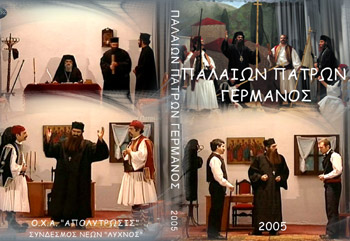
| Ἡμερομ. προβολῆς | Τίτλος θεατρικοῦ ἔργου |
Ἔτος παραστάσεως |
| 13/2 | Μέ τό κοντύλι καί τό καριοφίλι |
2002 |
| 20/2 | Καπετάν Βλαχάβας | 2001 |
| 25/3 | Ὁ Παλαιῶν Πατρῶν Γερμανός | 2005 |
| 10/4 | Πατριάρχης Γρηγόριος ὁ Ε΄ | 2003 |
| 23/4 | 2017 | |
| 8/5 | Τό Χάνι τῆς Γραβιᾶς | 2011 |
| 19/6 | Ἱερός Λόχος | 2015 |
| 9/7 | Ἀρχιεπίσκοπος Κύπρου Κυπριανός | 1998 |
| 21/8 | 2012 | |
| 24/8 | 2013 | |
| 3/9 |
«Εἴτε θάνατος εἴτε λευτεριά» | 2018 |
| 14/9 | Φιλική Ἑταιρεία |
2014 |
| 23/9 | Γεωργάκης Ὀλύμπιος | 2016 |
| 9/10 | Ἰωάννης Καποδίστριας | 2006 |
| 29/10 | Κ. Κανάρης |
1999 |
| 10/11 | Οἱ ἀθάνατοι - Τό Σούλι | 2010 |
SUNDAY: THE DAY OF RESURRECTION (B)
Translation from the book:
Στεργίου Ν. Σάκκου, ΚΥΡΙΑΚΗ ἡ ἀναστάσιμη ἡμέρα,
ἐκδ. «ΧΡΙΣΤΙΑΝΙΚΗ ΕΛΠΙΣ»
ΟΡΘΟΔΟΞΗ ΑΔΕΛΦΟΤΗΤΑ, ἔκδ. 4η, Θεσ/νίκη 2020, σσ. 17-24
(Stergios N. Sakkos [Read CV],
SUNDAY: The Day of Resurrection, pp. 17-24)
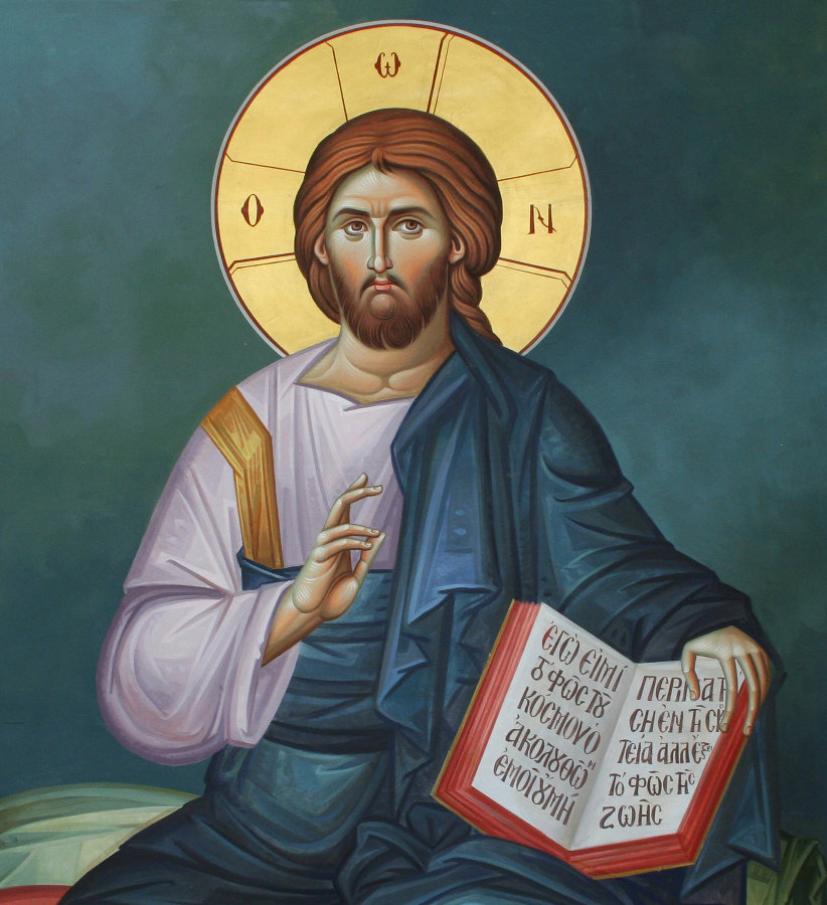 Part 2
Part 2
Sunday: its theology
God came and walked on earth. He left His footprints on several places and some of these are:
• The stable in Bethlehem, where He was born in a manger,
• the lake in Galilee, where He walked and chose His first disciples,
• the hillsides and plains that heard His voice teaching the crowds,
• the mount of Transfiguration that saw His divinity shining like the sun,
• the garden of Gesthemane, where He shed tears of anguish,
• the place of Golgotha, where He shed His blood,
• his empty tomb.
The whole Palestine, which He crossed “doing good and healing” (Acts 10,38), is the Holy Land that reminds us of Godman's visit. We can go to this Holy Land if we wish and kneel on the sacred ground. However, we can also find this Holy Land in every Church because there we can enter Christ's life through the Holy Sacraments:
♦ In the Prothesis (Preparation table) we see Bethlehem,
♦ in the Holy Altar we stare at Golgotha,
♦ in the baptismal font we see the river Jordan,
♦ from the oil lamp of the sanctuary we take the light of the Resurrection.
On the other hand, during His lifetime lots of divine signs took place:
◊ Epiphany, when God Father showed His Son and the Holy Spirit rested on Him in the form of a dove,
◊ the Passion, when Jesus was gradually led to His crucifixion and death,
◊ the Resurrection, that filled with light and happiness the hearts of the faithful,
◊ the Ascension, which glorified human nature,
◊ the Pentecost, when the Holy Spirit laid the foundation of the Church.
All those supernatural events that brought salvation to the suffering human beings are the religious celebrations of our Church that keep, through the grace of the Sacraments, alive the presence of Christ among us. So, the faithful, no matter of the age we live in, can:
√ Meet our Lord Jesus Christ, the Godman,
√ become his disciples,
√ walk with Him,
√ listen to His words,
√ see His miracles,
√ live His Resurrection,
√ commune Him.
All the above, that is, the Holy Land and the sacred celebrations, are offered in a way that only God could cοnceive and attain, in the day of Sunday. On Sunday and during the Divine Liturgy, being its essential feature, we gather in church where our Lord comes physically through the Holy Eucharist. Sunday helps us to take part in His life from the manger to the empty tomb. There, in the Church, in front of the holy altar and among the angels and saints we embrace God’s space and our soul rests, because it senses the divine eternity. At the same time we enter in God’s time through the Holy Communion where Christ is present in the bread of Prothesis, on the altar and in the Holy Chalice. Then our soul, full of eternity, rejoices. Sunday offers a spiritual space without borders and a limitless time. It brings God both in our life and heart... Sunday offers an always present experience of God’s love, which is expressed and realized tangibly in the Divine Liturgy.
It is, also, a living memorial of the past, a kind of a historical witness. It is a one and only witness in the course of humanity that constantly testifies the redemptive work of the resurrected Christ until this day.
Also, Sunday is a prophecy of the future, as the enlightened Fathers of our Church have remarked. The present world is included in the seven days of the week, which are constantly recycled till this world comes to an end. Sunday is considered to be the eighth day, which succeeds the seventh, and prophesies the future life, inaugurated by Christ’s resurrection. This eighth day is the sweet eternity of God’s kingdom. It starts now in Christ’s Church and expands farther after this earthly time. Sunday allows us to have this experience in advance.
When God started the creation of the world by bringing light in the abyss it was the first day of time. “And there was evening and there was morning, one day” (Ge 1,5). It was also the first day of the week when Christ started reforming mankind by defeating death in Hades, “But on the first day of the week” (Lk 24,1). So, on Sunday the faithful celebrate both the birthday of the creation and the revival of humanity by Jesus Christ, while we experience in advance the future world of eternity, the heavenly rebirth.
When we talk about the theological meaning of Sunday, we present the great truths of our faith. Sunday is:
• The first day of the world’s creation,
• the day of the Resurrection and man’s re-creation,
• the apocalyptic day of the future eternity,
• the day of Divine Liturgy in our church life.
Thinking of Sunday we feel, indeed, the need:
◊ To thank God for the world He offered us,
◊ to praise Him for His Church and His Resurrection and,
◊ to have an ever ending expectation for His blessed kingdom.
The existence of Sunday in the worldly calendar constitutes a visit of God Himself, Who by approaching us breaks the earthly boundaries and opens the way to heaven, the way that leads to His Presence.
To be continued
Copyright © 2021 by Orthodox Christian Association «ΧΡΙΣΤΙΑΝΙΚΗ ΕΛΠΙΣ» ΟΡΘΟΔΟΞΗ ΑΔΕΛΦΟΤΗΤΑ. Used by permission. All rights reserved.
THE TRUE CHRISTIAN
Translation from the article:
Εὐαγγέλου Ἀλ. Δάκα, Ὁ ἀληθινός χριστιανός, περιοδ. "Ἀπολύτρωσις" 76 (2021) 4-5.
(Evangelos Al. Dakas, PhD in Theology and Philologist)
In the face of a new year, like the one that just dawned, it is imperative that we do a proper and honest self-examination. What did we achieve in the year that ended? What do we have in our hands? What did we lose? What do we expect for the year ahead? And of course, if we are to measure ourselves by the various criteria of this world, much more must we measure ourselves by the criteria of our faith. Do we truly believe? Are we true Christians? What relationship do we have with Holy God?
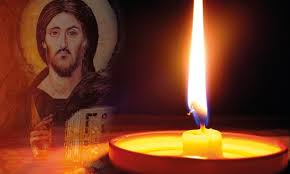 These questions may seem provocative to some. We have learned to take our Christian identity for granted and therefore they’re perhaps incomprehensible to us. However, the Word of God advises: “Examine yourselves to see whether you are in the faith; test yourselves (2 Cor 13,5). It does not say "you have tried" but "try". It’s in present tense which means duration. That is, not to examine ourselves once, but continuously and completely. It is not enough that we were once connected with Christ. The important thing is that our connection is maintained active "until death" (Rev 2,10). “Everything is judged by its end”, says our wise folk.
These questions may seem provocative to some. We have learned to take our Christian identity for granted and therefore they’re perhaps incomprehensible to us. However, the Word of God advises: “Examine yourselves to see whether you are in the faith; test yourselves (2 Cor 13,5). It does not say "you have tried" but "try". It’s in present tense which means duration. That is, not to examine ourselves once, but continuously and completely. It is not enough that we were once connected with Christ. The important thing is that our connection is maintained active "until death" (Rev 2,10). “Everything is judged by its end”, says our wise folk.
Unfortunately, the pandemic that broke out recently revealed that many of the faithful have a distorted relationship with the Lord. We do not approach him as he wants us to, but as we think we should. And the consequences, of course, are painful. Why does this happen? The causes are many and perhaps a simple member of the Church may bear a small percentage of responsibility for this situation. However, I would not like to deal with this issue now. In the limited space we have at our disposal, I think there is an urgent need to study something else, more basic: to review in some way, in the light of the recent crisis, what makes a true Christian and what is his quality and his limits. Therefore, according to "which once and for all was handed over to the faithful" (Jude 3), that is, the teaching of the Gospel:
• A true Christian first and foremost loves God the Savior, as revealed in the Bible and in the apostolic tradition of the Orthodox Church. He does not worship other gods, not even his passions and desires. He is not a slave of his obsessions and doesn’t follow various perceptions about God. He only follows the Lord’s teachings and not human creations.
• The true Christian humbly obeys the commandments of God and thus in this way he expresses his love. Humbly means that he never aims at the Pharisaic self-satisfaction and the glory of himself. That he has as a motto of his life "remain in obscurity" and tries to hide himself so that the Lord can reveal himself through him. A true Christian does not sacrifice God for his own benefit but instead his benefit for the sake of God.
• A true Christian is not trapped in this world. He knows very well that “our citizenship is in heaven” (Phil 3,20) and that “for here we do not have an enduring city, but we are looking for the city that is to come” (Heb 13,14). Therefore, he does not depend on the earthly goods nor does he despair when he loses them. He only seeks the necessities and does not seek lots of things because he knows that these are nailing us to the ground and this is a great threat to spirituality.
• A true Christian does not pursue a miracle nor does he demand one nor does he consider it as given. He knows that the Lord gives as many miracles as He wants and when He wants, that He mainly gives them to support the unbelievers and not the believers, and that to believe that He "owes" you a miracle is simply arrogance.
• A true Christian loves his fellow man as he loves himself. He sees in him the image of God regardless of origin, religion, social status or gender. Ηe stands before him with respect and willingness to support him in everything. He is able to sacrifice for him anything of his own, even his own life, if need be. He does not reject him for his fall and does not judge him. He hates sin, but not the sinner.
• A true Christian does not take revenge, only forgives. And even when he is harmed and endures injustice, he continues to keep his arms open for all. He does not ask for anything in return for his love, nor does he expect anything in return. He overcomes evil with good, he blesses, he does not curse, he does not threaten. And when he needs to be steadfast, he is not abusive, but always has in front of him as a rule the salvation of his brother.
• Finally, a true Christian possesses the truth, but never tries to impose it. He absolutely respects the opinion of the other person and discusses with him, as much as it depends on him, peacefully. He does not become vindictive or offensive, and always acknowledges his mistakes and omissions. The true believer does not boast of knowing the truth, but tries to help the other person to understand, without offending his freedom or dignity at all.
In conclusion, a true Christian has nothing to do with religiosity or fanaticism. On the one hand, he fights for his spiritual training and does not resort to simple excuses that remind us of idolatry, while on the other hand, if necessary, he sacrifices himself for his faith; and he does not kill others to "defend" it.
A true Christian is, in other words, a true imitator of Christ.
Copyright © 2021 by Orthodox Christian Association «ΧΡΙΣΤΙΑΝΙΚΗ ΕΛΠΙΣ» ΟΡΘΟΔΟΞΗ ΑΔΕΛΦΟΤΗΤΑ. Used by permission. All rights reserved.
THE “LITURGY OF THE FAITHFUL” (A)
INTRODUCTION TO THE “LITURGY OF THE FAITHFUL”
Bishop Augoustinos N. Kantiotes (1907-2010) wrote short sermons on the Divine Liturgy. These sermons are characterized by their simple style and language. They are not intended for theologians or specialists, but for common people. So many examples are used to make their message clear. Although they are simply written, they deal with profound theological issues.
These sermons were published in Greek in two volumes. In the second volume (ἐπισκόπου Αὐγουστίνου Ν. Καντιώτου, μητροπ. Φλωρίνης, Εἰς τήν Θείαν Λειτουργίαν, Πρακτικαί Ὁμιλίαι, τόμ. Β΄, ἔκδ. Ε΄, «Σταυρός», Ἀθῆναι 2007) the author gives a more detailed discussion of the more important part of the Divine Liturgy, “The Liturgy of the Faithful”. We’ll translate, in a series of articles, some extracts from this book.
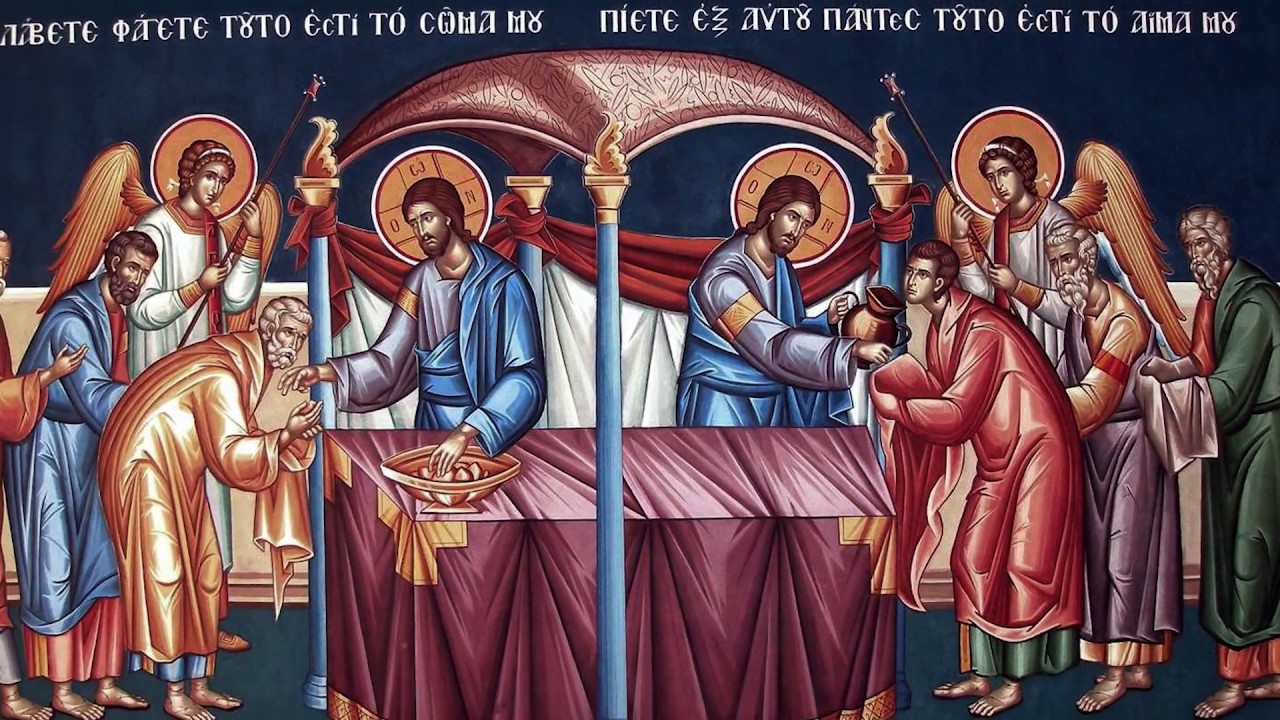 The Divine Liturgy is one of God’s greatest gifts to man. While participating in it, the believer not only communicates with the Triune God, but is mystically united with the God-Man, our Lord. The Divine Liturgy is a beautiful service of petitions and supplications, which involves all of man’s material and spiritual needs. But above all is an offering. Man offers God the simple material gifts of bread and wine, and God in return offers man the same gifts changed into the Body and Blood of Christ. The moment when a believer receives the Body and Blood of our Lord and Savior, Jesus Christ, is holy, divine and of utmost sweetness. Unfortunately, this treasure is perceived by only a few and appreciated by even fewer. A true believer is grieved when he sees that only very few people attend regularly church services.
The Divine Liturgy is one of God’s greatest gifts to man. While participating in it, the believer not only communicates with the Triune God, but is mystically united with the God-Man, our Lord. The Divine Liturgy is a beautiful service of petitions and supplications, which involves all of man’s material and spiritual needs. But above all is an offering. Man offers God the simple material gifts of bread and wine, and God in return offers man the same gifts changed into the Body and Blood of Christ. The moment when a believer receives the Body and Blood of our Lord and Savior, Jesus Christ, is holy, divine and of utmost sweetness. Unfortunately, this treasure is perceived by only a few and appreciated by even fewer. A true believer is grieved when he sees that only very few people attend regularly church services.
Hopefully, after reading these sermons, Christians will attend the Divine Liturgy with more reverence and will participate more often and with faith in the Holy Communion so that they can chant at the end: “We have seen the pure Light, we have found the true Faith, worshipping the undivided Trinity, Who has saved us”.
MESSAGES ABOUT “HOPE” FROM THE THREE HIERARCHS
Messages about “Hope” from the three Hierarchs:
Basil the Great, John Chrysostom and Gregory the Theologian
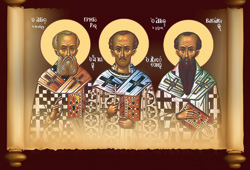 The three holy Hierarchs have been rightly characterized as the preachers of hope. In their wonderful writings they often refer to this subject, which nowadays is so relevant and necessary for everyone. Modern people experience insecurity and despair. The three saints Hierarchs can support and comfort us through the only "Living hope" of the world, Lord Jesus Christ.
The three holy Hierarchs have been rightly characterized as the preachers of hope. In their wonderful writings they often refer to this subject, which nowadays is so relevant and necessary for everyone. Modern people experience insecurity and despair. The three saints Hierarchs can support and comfort us through the only "Living hope" of the world, Lord Jesus Christ.
1. Blessed is the one who rests his hope in God only and not to the hope that the world offers... (M. Βασιλείου, Εἰς Ἠσαΐαν 10· PG 30,549C-D) (Basil the Great, On Isaiah 10, PG 30,549C-D).
2. God, the Holy One, promises to those who have their hope in Ηim, to give them a way out of sorrow. Therefore, despite the fact that we have reached the ultimate limit of evil, we do not abandon hope in God, but we try to discern the works of His helping hand (Μ. Βασιλείου, Ἐπιστολαί 242· ΕΠΕ 2,26) (Basil the Great, Letters 242· EΠΕ 2,26).
3. Hope inspires courage for the future, even in times when what is seen leads to despair (Ἰω. Χρυσοστόμου, Εἰς Ψαλμούς 142· ΕΠΕ 7,380) (John Chrysostom, On the Psalms 142, EΠΕ 7,380).
4. We may suffer a lot but we have a powerful hope. We face dangers and intrigues, but we have the Οne who saves us. He is not a human being but God Himself (Ἰω. Χρυσοστόμου, Εἰς Α΄ Τιμόθεον 1,2· ΕΠΕ 23,124) (John Chrysostom, On the First Letter to Timothy 1,2· ΕΠΕ 23,124).
5. In my life, I rely more on You, Jesus Christ, for encouragement than on my own efforts (Γρηγορίου Θεολόγου, Ποιήματα ΟΣΤ΄, ΕΠΕ 10,396) (Gregory the Theologian, Poems 76, ΕΠΕ 10,396).
Copyright © 2021 by Orthodox Christian Association «ΧΡΙΣΤΙΑΝΙΚΗ ΕΛΠΙΣ» ΟΡΘΟΔΟΞΗ ΑΔΕΛΦΟΤΗΤΑ. All rights reserved.
ΚΟΡΟΝΟ-ΙΟΣ 2020-21

Παραφρονήσαμε, Κύριε...
Θέλαμε ἕναν κόσμο διαφορετικό,
καλύτερο ἀπό αὐτόν πού ἡ ἀγάπη Σου δημιούργησε.
Χωρίς φραγμούς καί περιορισμούς στή Νομοτέλεια.
Ἕναν κόσμο χωρίς τή δική Σου σφραγίδα, Κύριε.
Προγραμματίσαμε, κουραστήκαμε, ξοδέψαμε δισεκατομμύρια
γιά ἔρευνα, συνέδρια, δημοσιεύσεις.
Τελικά τά καταφέραμε χωρίς Ἐσένα.
Χαρτογραφήσαμε τό γονιδίωμά μας.
Φτάσαμε ἐπιτέλους νά «διαχειριζόμαστε» τό DNA μας
καί τό διαμορφώνουμε κατά πως μᾶς ἀρέσει,
γιατί θεωροῦμε ὅτι Ἐσύ
δέν μπόρεσες νά τό δημιουργήσεις καί «τόσο κατάλληλο».
Πετᾶμε στά σκουπίδια ἑκατομμύρια ζωές πρίν γεννηθοῦν,
γιατί περισσεύουν πάνω στή γῆ μας.
Γεμίσαμε μέ μηχανές, ρομπότ καί ἔξυπνους ὑπολογιστές,
γιατί Ἐσύ μονάχα σῶμα καί ψυχή καί νοῦ μᾶς ἔδωσες
καί δέν ξέρεις ἀπό τεχνητή νοημοσύνη.
Μεταλλάσσουμε τή γύρω φύση,
μεταλλάσσουμε τήν ἴδια μας τή φύση
κατά πως βολευόμαστε μέ ὕβρη καί ἀλαζονεία.
Χωρίς σέβας στόν ἄνθρωπο καί στά δημιουργήματα τῆς πλάσης.
Περισσεύει τό διοξείδιο καί δυσπνοοῦμε.
Κάνουμε ταξίδια ἀναψυχῆς ὑπερατλαντικά καί διαστημικά
κι ἀφήσαμε τά ταξίδια στό μέσα μας.
Χαραμίσαμε τή ζωή μας
θαυμάζοντας αὐτάρεσκα τά ἐπιτεύγματά μας,
χειροκροτώντας μετά μουσικῆς τά χωματένια μας αγάλματα
καί αὐτά ἔπεσαν καί μᾶς καταπλάκωσαν.
Ὑπογράψαμε πρωτόκολλα ἐπιστημονικά
μέ στόχο νά μακραίνουμε τή ζωή μας,
νά τήν ὁρίζουμε ἐμεῖς, πότε θά ἀρχίζει, πότε θά τελειώνει,
νά ἐφιππεύσουμε στόν θάνατο,
νά γίνουμε ἀθάνατοι, χωρίς νά ἔχουμε ἀνάγκη τή δική Σου Ἀνάσταση.
Βρήκαμε φάρμακα πολλά
κι ἐμβόλια καί μονοκλωνικά καί ἀντιβιοτικά
καί νιώσαμε ἀσφαλεῖς,
νικητές ἐπιτέλους τοῦ θανάτου καί τῆς ζωῆς.
Καί ἐκεῖ πού ὅλα τά εἴχαμε τακτοποιήσει
καί εὐφραίνονταν κι ἡ ψυχή καί τό σῶμα μας,
ἦρθε ἡ καταιγίδα.
Χείμαρρος απρόσμενος.
Ἐχθρός ἀόρατος κήρυξε πόλεμο ἀδυσώπητο
καί σπέρνει τόν θάνατο σέ ὅλη τήν οἰκουμένη.
Θερίζει ἀδιάκριτα μεγάλους καί μικρούς.
Δέν σέβεται τίποτα καί κανέναν.
Καί ἀκυρώνει τήν ἐπιστήμη μας,
ἀνατρέπει τήν οἰκονομία μας,
ταράσσει τή φιλοσοφία μας,
γκρεμίζει τήν ἀλαζονεία μας,
καταστρέφει τήν παντοδυναμία μας.
Παραφρονήσαμε, Κύριε...
Θέλαμε ἕναν κόσμο διαφορετικό,
καλύτερο ἀπό αὐτόν πού ἡ ἀγάπη Σου δημιούργησε.
Χωρίς φραγμούς καί περιορισμούς στή Νομοτέλεια.
Ἕναν κόσμο χωρίς τή δική Σου σφραγίδα, Κύριε.
Τά καταφέραμε καλά.
Ὁ «ἄλλος κόσμος, ὁ διαφορετικός» εἶναι μπροστά μας.
Ἐδῶ πού φτάσαμε, Κύριε, περάσαμε τό σύνορο.
Στή φρεναπάτη μας καί στό ὀλέθριο ὀλίσθημά μας
δῶσ’ μας ταπείνωση νά συλλάβουμε τό μήνυμά Σου.
Κύριε, γίνε ἵλεως πρίν τελικά καταδικαστοῦμε.
Γ.Δ.
SUNDAY: THE DAY OF RESURRECTION (A)
Translation from the book:
Στεργίου Ν. Σάκκου, ΚΥΡΙΑΚΗ ἡ ἀναστάσιμη ἡμέρα,
ἐκδ. «ΧΡΙΣΤΙΑΝΙΚΗ ΕΛΠΙΣ»
ΟΡΘΟΔΟΞΗ ΑΔΕΛΦΟΤΗΤΑ, ἔκδ. 4η, Θεσ/νίκη 2020, σσ. 5-14
(Stergios N. Sakkos [Read CV],
SUNDAY: The Day of Resurrection, pp. 5-14)
Introduction
By John Chrysostomos, PG 51,265. “About Charity”
Death was abolished on Sunday. The curse was erased. The sin was cleared. The gates of hades were torn apart. Devil was chained up. The ever-lasting war stopped and God reconciled with all people. Men came back to their previous or rather to a much more noble condition. The sun saw that wonderful and strange sight: men becoming immortal. So, if people have a feast and a formal celebration of their birthday –in honour of this exceptional event – it is even more important for us to honour Sunday. It is the day which can be certainly considered as the birthday of all human nature. Indeed, we were lost and found; we were dead and regained life; we were enemies and came to reconciliation. Therefore it is appropriate to honour Sunday only in a spiritual way: not with festivities, dancing, drinking and getting drunk but by helping generously our poor brothers.
Part 1
Sunday: its history
Sunday: this word sounds so sweet in our ears and heart! It can touch even the most corrupt. It brings to our mind the most beautiful and tender moments of our life. It is wrapped in a festive glow and embellished with the happy meetings with the dearest ones. Most of all, it is wreathed in valuable, divine gifts; it is itself a divine gift to humans.
When mentioning Sunday we refer to Lord Himself, to the Church, the Gospels, God’s plan for man’s salvation. We trace its history and theology in the Holy Scripture since the beginning of God’s history.
When the six days of creation were over, God “rested on the seventh day from all his work which he had done” (Ge 2,2). That is, He stopped the work of creation on the seventh day. But He did not stop working, because as Jesus Christ His Son, attests “My father is working still, and I am working” (Jn 5,17). He continued and goes on working, ruling and preserving the world. This ruling and preservation of the world is an act not inferior than that of the creation. His repose and rest means this ceaseless divine providence.
He built a beautiful house for us to enjoy: the universe. He created us with His love and then He rested. He stepped back and since then He is pleased and happy to take care of us and endow the world with His presence in various ways.
On the seventh day which He blessed and considered as sacred, He started communicating with His creatures. He made a distinction between that one and the rest of the days. He established it as the day of His worship and ordered His chosen people “Remember the Sabbath day, to keep it holy. Six days you shall labour and do all your work; but the seventh day is a Sabbath to the Lord your God; in it you shall not do any work” (Ex 20, 8-10). As the seventh day denotes for God His constant care and providence for us, in the same way the day of Sabbath implies for His people the exclusive service and worship of God. Lord created everything for man, but He created man for himself. So, He asks man to dedicate a day of rest from his daily duties in order to study God’s will and offer his love to others to be able to meet God. “Be still, and know that I am God” (Ps 45(46),10) the psalmist suggests. This is the first aim of people’s resting and celebrating Sunday: undisturbed communication with God.
Unfortunately, soon after the creation of the world and the blessing of Sabbath, the transgression of the first men caused a breach to the relationship between humans and their Creator. Although the Law tried to keep open the road which leads from earth to heaven, the seed of sin which (circulated in) ran through human race, always raised an obstacle between the Creator and His creature. However, the bond between man and God was maintained. The covenant was preserved until the salvation was established that is, the new order our Lord Jesus Christ brought on earth. With His work and sacrifice a new cosmogony took place, a new world was created, the spiritual one: His Church. As after the first creation of the world, God rested and that signifies His loving care of the world, so Christ’s Resurrection, which sealed the second creation of the Church, determines a new relationship of familiarity between God and people.
 On “The first day of the week” (Lk 24,1), Christ resurrected and our human nature was resurrected with Him. God blessed that day and turned it into a new Sabbath, which replaced the old one. This keeps all the old attributes while gaining new graces. Nobody has seen God creating or resting, so the old Sabbath was established through orders. The new one was founded on the fact of Christ’s resurrection and it is testified by history. The old Sabbath demanded sacrifices and offerings to God. The new one offers Lord’s sacrifice and He nurtures us with it. In Christ’s new creation we have a new day now. It is as if heaven opened and a fragrant flower appeared, as if a precious jewel was given to our hands, as if we were offered the most expensive gift by Lord. In order to consider(estimate) it as something special and not like everything else on earth, like an ordinary day, He wrote His name on it: Sunday (in Greek Kiriaki means the day of Kirios =Lord). Lord marked His day as we do, when we write our name on our own things to identify them, and then He donated it to us.
On “The first day of the week” (Lk 24,1), Christ resurrected and our human nature was resurrected with Him. God blessed that day and turned it into a new Sabbath, which replaced the old one. This keeps all the old attributes while gaining new graces. Nobody has seen God creating or resting, so the old Sabbath was established through orders. The new one was founded on the fact of Christ’s resurrection and it is testified by history. The old Sabbath demanded sacrifices and offerings to God. The new one offers Lord’s sacrifice and He nurtures us with it. In Christ’s new creation we have a new day now. It is as if heaven opened and a fragrant flower appeared, as if a precious jewel was given to our hands, as if we were offered the most expensive gift by Lord. In order to consider(estimate) it as something special and not like everything else on earth, like an ordinary day, He wrote His name on it: Sunday (in Greek Kiriaki means the day of Kirios =Lord). Lord marked His day as we do, when we write our name on our own things to identify them, and then He donated it to us.
To be continued
Copyright © 2021 by Orthodox Christian Association «ΧΡΙΣΤΙΑΝΙΚΗ ΕΛΠΙΣ» ΟΡΘΟΔΟΞΗ ΑΔΕΛΦΟΤΗΤΑ. Used by permission. All rights reserved.
THE REAL MEANING OF CHRISTMAS IN FIVE QUESTIONS
Translation from the article:
Στεργίου Ν. Σάκκου, Τά πέντε ἐρωτήματα.
(Stergios N. Sakkos, University Professor [Read CV])
 Christmas is coming and lots of Christians desire to have a deep experience of this great mystery, God’s Incarnation. People usually think of Jesus’ birth as an old, romantic story. Consequently, they do not benefit from it in order to make spiritual progress. There are some questions through which we can discover the only truth in the Holy Bible. These will help us to be fully informed about the Incarnation.
Christmas is coming and lots of Christians desire to have a deep experience of this great mystery, God’s Incarnation. People usually think of Jesus’ birth as an old, romantic story. Consequently, they do not benefit from it in order to make spiritual progress. There are some questions through which we can discover the only truth in the Holy Bible. These will help us to be fully informed about the Incarnation.
The first question is: Who was born?
- The Person who all the nations waited for. “The people that walked in darkness have seen a great light: they that dwell in the land of the shadow of death upon them hath the light shined” (Is 9:2).
- When man lost paradise and was sent to exile, he was given a promise about a Savior. He kept that promise in his mind. Since then, all people had been searching for Him in thousands of ways up to that night, when they recognized Him in the newborn child.
- All the prophets of Israel testify with their prophecies that the boy who was born is the Messiah, Emmanuel. God himself came among men. David’s Psalms and Isaiah’s visions are fulfilled in this person who the Holy Spirit declared to be the greatest Prophet, King and High Priest.
- In addition to these, the angel who informed Joseph about the supernatural birth, gave the answer to our question: Jesus is the Messiah and “he will save his people from their sins” (Mt 1:21).
- Wise Men’s leading star declared that the Sun of Justice was born and all mankind would be reconciled with God.
- Much later, John the Baptist said pointing to Him: “He is God’s Lamb and will carry all men’s sins” (Jn 1:29).
- During Jesus’ baptism God’s voice was heard: “He is my beloved Son” (Mt 3:17).
- The fourth Gospel starts with these words: “In the beginning was the Word ... and the Word became flesh and dwelt among us ... the only begotten of the Father ...”
- Jesus Himself gave the answer that irritated his enemies and astonished the crowds. “I am the Light, the Truth and the Life” (Jn 9:5, 14:6) “...without me you can do nothing” (Jn 15:6).
The second question refers to the time of Jesus’ birth: When was he born?
- ·The Gospels give us exact and specific information about it. This birth took place “In the days of Herod, King of Judea...” (Lk 1:1) and when “Caesar Augustus” (Lk 2:1) was the emperor. But this is a limited human aspect of the time of the birth.
- Apostle Paul gives a theological answer. Jesus was born “when the time had fully come” (Gal 4:4). When it was the suitable time for the world to accept his Savior. It was the time when the sin gave its most corrupt fruit: a dying humanity. There was no time left for any delay. Just then God’s Grace offered the most fragrant flower: the humble, virgin, young girl.
The third question has to do with a very touching and sensitive issue concerning the divine birth. Where was he born?
- Jesus chose a well-known town, Bethlehem of Judea, where King David was also born. However, as Jn 1:11 says: “He came unto his own, and his own received him not”. He met hatred and rejection. There was no house or any decent place for the Messiah. A filthy stable, where animals lived, was His first house. He was put in a manger and on the straw they had for the animals.
- Bethlehem’s stable is the best picture to depict the spiritual condition of humanity at that age. The whole world had turned into a huge stable where people gave in their passions. That was the world where Jesus Christ was born.
The fourth question is: How was He born?
- ·The Holy Bible gives the answer that He was born from the Holy Spirit that dwelt in virgin Maria. “The Holy Spirit will come upon you, and the power of the Most High will overshadow you” (Lk 1:35).
- The angel said to Joseph: “... that which is conceived in her is of the Holy Spirit” (Mt 1:20).
- No man was involved in that birth. It is a supernatural mystery which transcends human logic.
- He did not descent from heaven in a spectacular way.
- God’s Incarnation followed the natural way as in any woman, that is, the baby remained in his mother’s womb for nine months. He came to life as an infant and passing through all the stages of human life, he grew up into an adult.
- We read in Lk 2:1 “In those days a decree went out from Caesar Augustus that all the world should be enrolled”. The emperor ordered this census, because he wanted to learn the number of people under his rule. Jesus was born the night before the census. Messiah who came to give freedom to the world, was enrolled as a new slave. He chose to be one of the slaves of the Roman Emperor and as a result, He had to pay taxes to live and that was very humiliating for Him.
The fifth question is: Why was He born? What is the purpose of this divine plan? In the Apostolic preaching there is always an emphasis on this purpose.
- “The reason the Son of God appeared was to destroy the works of the devil” ( 1 Jn 3:8).
- He was born to redeem us from our sins and therefore destroy death “The last enemy to be destroyed is death. For God has put all things in subjection under his feet” (1 Cor 15:26-27).
- He was born to bring back those that had gone astray. “I have found my sheep which was lost”, “For the Son of man came to seek and to save the lost” (Lk 15:6, 19:10).
- He was born to
- He was born so we can be his children again and call God our “father”. “But to all who received him, who believed in his name, he gave power to become children of God” (Jn 1:12).
- He was born to unite humanity “There is neither Jew nor Greek, there is neither slave nor free, there is neither male or female for you are all one in Christ Jesus” (Gal 3:28).
- He was born to give His own happiness and peace “my peace I give to you” Jn (14:27).
However, Jesus’ birth is not a past event. It is a personal fact for everyone. It is an event that is personally connected to each person.We need to look at these five questions, which we have already answered, in close relation to our own life.
- Who was born? My Redeemer.
- When was He born? When I welcomed him inside me.
- Where was He born?In my heart.
- How was He born? Through His Word and the Sacraments of the Orthodox Church.
- Why was He born? To help me find the way to eternity and live in paradise from now on. If the meaning and the message of Christmas is this for me, then:
- I will surely hear a host of angels singing within me “Glory in the highest”, because God, the Emmanuel, will visit my soul.
- My heart will be overwhelmed by a divine happiness.
Copyright © 2021 by Orthodox Christian Association «ΧΡΙΣΤΙΑΝΙΚΗ ΕΛΠΙΣ» ΟΡΘΟΔΟΞΗ ΑΔΕΛΦΟΤΗΤΑ. Used by permission. All rights reserved.
Αρχιμ. Αυγουστίνος Μύρου «Χάσαμε ένα διαμάντι»
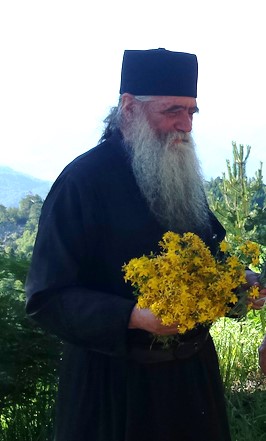 Την ώρα που χαράσσονται με δακρυσμένους οφθαλμούς οι γραμμές αυτές διαβάζεται η νεκρώσιμη ακολουθία του και κατεβαίνει το λείψανό του στον τάφο, που από χρόνια είχε ετοι-μάσει στο μοναστήρι του (Αγίου Νεκταρίου στο Παλιογράτσανο Κοζάνης), δίπλα στον τάφο του πατέρα του, π. Γεωργίου Μύρου. Η ψυχή μου είναι κατώδυνη, που, εξ αιτίας των σκληρών περιοριστικών μέτρων του Κορωνοϊού, δεν μπόρεσα να αποχαιρετήσω εκ του σύνεγγυς έναν εξαίρετο, καθόλα αξιοσέβαστο κληρικό, με τον οποίο συνδέομαι αδιάκοπα και αδιατάρακτα με αδελφική φιλία πενήντα έξι ολόκληρα χρόνια.
Την ώρα που χαράσσονται με δακρυσμένους οφθαλμούς οι γραμμές αυτές διαβάζεται η νεκρώσιμη ακολουθία του και κατεβαίνει το λείψανό του στον τάφο, που από χρόνια είχε ετοι-μάσει στο μοναστήρι του (Αγίου Νεκταρίου στο Παλιογράτσανο Κοζάνης), δίπλα στον τάφο του πατέρα του, π. Γεωργίου Μύρου. Η ψυχή μου είναι κατώδυνη, που, εξ αιτίας των σκληρών περιοριστικών μέτρων του Κορωνοϊού, δεν μπόρεσα να αποχαιρετήσω εκ του σύνεγγυς έναν εξαίρετο, καθόλα αξιοσέβαστο κληρικό, με τον οποίο συνδέομαι αδιάκοπα και αδιατάρακτα με αδελφική φιλία πενήντα έξι ολόκληρα χρόνια.
Θα μπορούσα να τοποθετήσω ως τίτλο του άρθρου τη φράση μιας κόρης μου, μόλις πληροφορήθηκε την αναχώρηση του π. Αυγουστίνου: «Ορφανέψαμε». Έτσι εξέλαβαν την κοίμησή του πολλοί πνευματικοί άνθρωποι της χώρας μας. Πώς αλλιώς να εξηγήσει κανείς ότι νεαρή μοναχή, που μαθήτευσε κοντά του, κλείστηκε στο κελί της και διάβασε όλο το ψαλτήριο και όλη τη νεκρώσιμη ακολουθία για ανάπαυση της ψυχής του! Πώς αλλιώς να εξηγήσει κανείς ότι ο Δρ Μπούσιας Χαράλαμπος, μέγας υμνογράφος της Αλεξανδρινής Εκκλησίας, τον αποκαλεί «Άγγελο, που φτερούγησε στον ουρανό»! Πώς αλλιώς να εξηγήσει κανείς τους στίχους του Κοζανίτη Καθηγητή της Ιατρικής, Γιάννη Κουντουρά:
«…με χαρά σιγοκλαίμε
και γλυκά πρωτολέμε:
- Αυγουστίνε νεαρέ,
ο Θεός να ευλογήσει
το πετραχήλι του λόγου σου».
Ένας άλλος ιεροκήρυκας από την Αθήνα, ο π. Δανιήλ Αεράκης, έγραψε: «Κλείδωσε το ωραίο του μοναστήρι στο Παλαιογράτσανο Βελβεντού και αναχώρησε για το Νοσοκομείο. Για τον αγνό πρεσβύτερο, ο πόνος του Νοσοκομείου έγινε ὁ προθάλαμος της χαράς του Παραδείσου».
Είναι όντως πνευματική ορφάνια η αναχώρηση ενός καταξιωμένου πνευματικού πατέρα, του οποίου η παρουσία, η κατηχητική, κηρυκτική και ποιμαντική διακονία και η όλη κοινωνική δράση αποτελούσε εγγύηση πατρικής μέριμνας εντός της Εκκλησίας. Η Ι. Μητρόπολη Σερβίων και Κοζάνης στερείται της πατρικής μέριμνας ενός εξαίρετου κληρικού της, πράγμα που αναγνωρίζει ο σεβασμιότατος κ. Παύλος.
Ο π. Αυγουστίνος υπήρξε γόνος ευσεβών γονέων, του ιερέως Γεωργίου Μύρου και της πρεσβυτέρας Σταυρούλας, των οποίων το σπίτι ήταν πάντοτε ανοιχτό για φιλοξενία κάθε ξένου που θα επισκεπτόταν το ορεινό χωριό τους, το Παλαιογράτσανο. Υπήρξε έξυπνος και επιμελής μαθητής, πρώτος στην τάξη του. Στις γυμνασιακές του σπουδές διέμενε στο οικοτροφείο των Σαράντα Μαρτύρων και υπήρξε είτε παραστάτης είτε σημαιοφόρος. Πάντα πρώτος. Ποτέ δεύτερος.
Ταλαντούχος και ευφυής πρωταγωνίστησε σε θεατρικά έργα, τα οποία άφησαν άριστες εντυπώσεις. Είχε ο Παναγιώτης (αυτό ήταν το λαϊκό του όνομα) πολύ καθαρή άρθρωση και τέλειο χρωματισμό της φωνής του. Παρέσυρε τον θεατή και όταν έπρεπε να συγκινηθεί και όταν έπρεπε να γελάσει. Πολλοί καθηγητές του τον παρότρυναν να σπουδάσει θέατρο, στο οποίο ήταν βέβαιο ότι τον περίμενε λαμπρή σταδιοδρομία. Ο Παναγιώτης όμως είχε επιλέξει τη Θεολογία, με την οποία ήθελε να διακονήσει την ελληνική νεολαία. Πέρασε πρώτος στη Θεολογική Αθηνών και την αποπεράτωσε με άριστα.
Θυμάμαι ότι στα φοιτητικά μας χρόνια συνεργαζόμασταν με τον Παναγιώτη στη διανομή των δηλώσεων του μακαριστού Μητροπολίτη Φλωρίνης Αυγουστίνου στις εφημερίδες. Την περίοδο της δικτατορίας εκδήλωναν οι συντάκτες των εφημερίδων ζωηρό ενδιαφέρον για δηλώσεις του Φλωρίνης λόγω της κριτικής που ασκούσε ο Μητροπολίτης στην τότε εκκλησιαστική ηγεσία, αλλά και λόγω της απουσίας αντιπολιτευόμενου λόγου.
Ο Παναγιώτης σπούδασε όχι μόνο θεολογία, αλλά και φιλοσοφία στο Πανεπιστήμιο Αθηνών. Μετέβη κατόπιν στην Αγγλία για μεταπτυχιακές σπουδές, τις οποίες περάτωσε με master και διδακτορικό. Απ’ όπου κι αν πέρασε άφησε άριστες εντυπώσεις και έδωσε την ορθόδοξη μαρτυρία του σε προτεστάντες και καθολικούς συμφοιτητές και καθηγητές.
Με την επιστροφή του στην Ελλάδα δόθηκε κυριολεκτικά στην κατήχηση και στο κήρυγμα. Οι κατηχήσεις και τα κηρύγματά του με τον μειλίχιο και τεκμηριωμένο λόγο, αλλά και με εμφανή τον άρτιο σχεδιασμό τους προσείλκυαν το ενδιαφέρον πολλών. Ήταν περιζήτητος ομιλητής. Χειροτονήθηκε διάκονος από τον Μητροπολίτη Νεαπόλεως και Σταυρουπόλεως κ. Διονύσιο και πρεσβύτερος από τον Ελασσόνος κ. Βασίλειο. Απ’ όπου κι αν πέρασε ο κόσμος τον αγάπησε και τον ακολούθησε. Ήταν αγαπητός απ’ όλους, επειδή διέθετε μια ανυπόκριτη αγάπη, την οποία αναγνώριζε εύκολα κανείς στα λόγια του και στη συμπεριφορά του.
Μεγάλη αδυναμία του ήταν το χωριό του, το Παλαιογράτσανο. Ήταν το αγνό χωριατόπουλο, που δεν εύρισκε ανάπαυση στις πολύβουες πόλεις παρά στο ήσυχο χωριό του. Εκεί προτίμησε να χτίσει και το ησυχαστήριό του, του Αγίου Νεκταρίου. Ιδιαίτερα προσείλκυαν κόσμο οι εξομολογήσεις του, στις οποίες λάμβανε μέρος πλήθος κόσμου, πολλά νεαρά άτομα αναμένοντας υπομονετικά τη σειρά τους μέχρι και τις μεταμεσονύκτιες ώρες. Πολύ γρήγορα διαδόθηκε η φήμη της διακριτικότητάς του στην εξομολόγηση και οργανώνονταν εκδρομές με λεωφορεία από διάφορα μέρη της Ελλάδος με αποκλειστικό στόχο την εξο-μολόγηση πιστών. Το ορεινό και απομονωμένο χωριό του έγινε έτσι ευρύτατα γνωστό. Το επισκέπτονταν ακόμη και αλλοδαποί (Άγγλοι, Σουηδοί), που έδειχναν ενδιαφέρον να γνωρίσουν την Ορθοδοξία και διανυκτέρευαν στους περιποιημένους χώρους του μοναστηριού ή και στον πύργο που έχτισε τελευταία.
Στους καλοκαιρινούς μήνες μία Κυριακή τον μήνα οργάνωνε συγκέντρωση οικογενειών και ανέπτυσσε ειδικά θέματα που αφορούσαν στην χριστιανική οικογένεια. Ο γράφων είπε κάποτε σε κάτοικο του χωριού, που έζησε χρόνια στη Γερμανία: «οφείλετε πολλά οι Παλιογρατσανιώτες στον π. Αυγουστίνο, που ζωντάνεψε το χωριό με τις δραστηριότητές του». Εκείνος όχι μόνο το παραδέχτηκε, αλλά πρόσθεσε: «Μια φορά χρησιμοποίησα ταξί στην Κοζάνη και μόλις έμαθε ο οδηγός ότι είμαι από το Παλιογράτσανο δεν μου πήρε αγώγι για χατίρι του π. Αυγουστίνου, τον οποίο εκτιμούσε πολύ».
Εκεί όμως που φάνηκε ιδιαίτερα ευρηματικός ήταν η πρωτοποριακή στελέχωση του μοναστηριού. Πόθος τόσο δικός του όσο και του πατέρα του ήταν η επάνδρωση της μονής με μοναχούς. Δυστυχώς δεν αξιώθηκαν να τη δουν. Τι έκανε ο καλός ποιμένας; Παρότρυνε τους συνεργάτες του, τα πνευματικά του παιδιά, έγγαμους οικογενειάρχες, να προσφέρει ο καθένας διακονία στις διάφορες εργασίες του μοναστηριού για δύο ημέρες κάθε μήνα. Έτσι και το μοναστήρι είχε κάθε μέρα δύο αναγκαίους διακονητές, που συμμετείχαν σε όλες τις ακολουθίες της μονής, αλλά και οι συνεργάτες του είχαν την ευκαιρία να ζήσουν για δύο ημέρες τον μήνα τη μοναστηριακή ζωή ως ένα είδος κοσμοκαλόγηρων. Προκειμένου μάλιστα να γνωρίσουν και οι νεότεροι τον ορθόδοξο μοναχισμό καθιέρωσε τριήμερα μαθητών Δευτεροβάθμιας Εκπαίδευσης με διαμονή και διατροφή στους χώρους της Μονής.
Ευφυής και ταλαντούχος ο π. Αυγουστίνος ασχολήθηκε παρά το φορτωμένο ποιμαντικό έργο και με τη συγγραφή βιβλίων επιστημονικού (θεολογικού) και ποιμαντικού χαρακτήρα. Πιο γνωστό και διαδεδομένο είναι η «Αντίσταση της Αγάπης», που περιγράφει τη δράση του ιεροκήρυκα π. Αυγουστίνου Καντιώτη στην Κοζάνη την περίοδο της κατοχής. Γνώρισε τρεις εκδόσεις και διαβάζεται πολύ ευχάριστα ως ένα είδος συναξαρίου. Σε πολλές δεκάδες ανέρχονται επίσης τα άρθρα του πάνω σε επίκαιρα εκκλησιαστικά και κοινωνικά θέματα. Δεν είναι τυχαίο το γεγονός ότι ο Μητροπολίτης Κοζάνης κ. Παύλος αυτόν όρισε ως εκπρόσωπο της Μητροπόλεώς του σε θέματα αιρέσεων και αντιαιρετικού αγώνα. Οι εβδομαδιαίες εκπομπές του στο West-Chanel με τίτλο «Ορθόδοξη Μαρτυρία» συγκέντρωναν μεγάλο ενδιαφέρον και ικανό πλήθος τηλεθεατών.
Δυστυχώς το ακριβό αυτό διαμάντι της περιοχής μας, τις αντοχές του οποίου θαύμαζε κανείς, όταν διέσχιζε αποστάσεις ολόκληρες με τα πόδια ή όταν σκαρφάλωνε στα βουνά για να μαζέψει τσάϊ ή ρίγανη για το μοναστήρι του, δεν βρίσκεται πλέον ανάμεσά μας. Το χάσαμε. Και το χάσαμε μ’ έναν μαρτυρικό για τον ίδιο τρόπο. Παρέμεινε έναν ολόκληρο μήνα διασωληνωμένος στο Ιπποκράτειο Νοσοκομείο Θεσσαλονίκης, χωρίς τη δυνατότητα να τον επισκεφθεί κανείς. Αυτόν που δεν παρέλειπε να επισκέπτεται, να παρηγορεί, να ενισχύει και να κοινωνεί ασθενείς. Η κηδεία του λόγω των σκληρών μέτρων του κορωνοϊού έγινε σε ερημικές συνθήκες. Ευτυχώς τον τίμησαν με την παρουσία και συμμετοχή τους ο Μητροπολίτης κ. Παύλος, ο Πρωτοσύγκελλος π. Χριστοφόρος, ο αρχιερατικός επίτροπος Βελβενδού π. Κωνσταντίνος και ο διάκονος της Μητροπόλεως. Σε κανένα από τα εκατοντάδες πνευματικά του παιδιά δεν επιτράπηκε η συμμετοχή. Λίγο πριν τον διασωληνώσουν είχε παρακαλέσει: «Ας περάσω μόνο εγώ όλη αυτή τη δοκιμασία του κορωνοϊού, αλλά κανένα από τα πνευματικά μου παιδιά». Έτσι τον εισάκουσε ο Θεός και πέρασε μόνος τη δοκιμασία και αναχώρησε μόνος για τον ουρανό. Όχι όμως εντελώς μόνος. 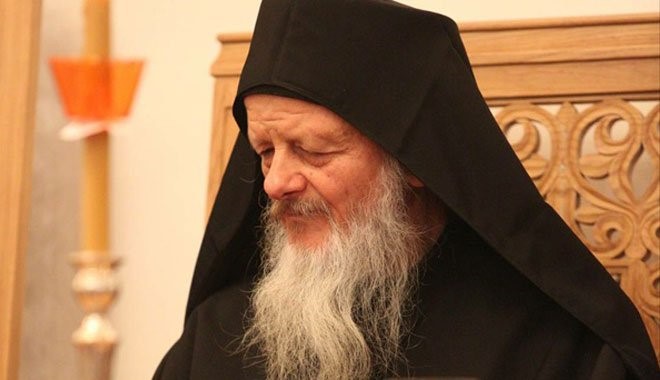 Τέσσερις ώρες μετά τη δική του αναχώρηση τον ακολούθησε ο πνευματικός του πατέρας, ο ιερομόναχος π. Πανάρετος της μονής Γρηγορίου Αγ. Όρους. Άλλο ένα διαμάντι κληρικού. Και αυτό από τη δική μας περιοχή, από το Βόϊο. Προηγήθηκε ο πνευματικός υιός για να υποδεχθεί στον ουρανό τον πνευματικό του πατέρα. Μία ευλαβής ψυχή είπε: «Και οι δύο αυτοί -να μου το θυμάστε- θα ανακηρυχθούν μία ημέρα άγιοι». Αιωνία τους η μνήμη!
Τέσσερις ώρες μετά τη δική του αναχώρηση τον ακολούθησε ο πνευματικός του πατέρας, ο ιερομόναχος π. Πανάρετος της μονής Γρηγορίου Αγ. Όρους. Άλλο ένα διαμάντι κληρικού. Και αυτό από τη δική μας περιοχή, από το Βόϊο. Προηγήθηκε ο πνευματικός υιός για να υποδεχθεί στον ουρανό τον πνευματικό του πατέρα. Μία ευλαβής ψυχή είπε: «Και οι δύο αυτοί -να μου το θυμάστε- θα ανακηρυχθούν μία ημέρα άγιοι». Αιωνία τους η μνήμη!
Δρ Τσακαλίδης Γεώργιος
